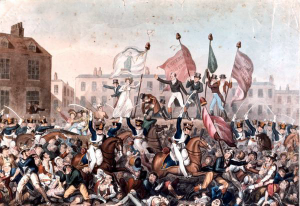The growing urban discontent that led to the infamous meeting in 1819, like other occasions of civil unrest covered in the Manchester Ballads, grew out of a combination of circumstances that, seen in hindsight, were almost bound to end in conflict.
On the 16th August 1819, the area around St Peters Square in Manchester was the site of a peaceful protest that ended in bloody confrontation with the authorities. Quickly dubbed ‘Peterloo’, the name is a satirical comment on what was seen as the cowardly actions of the soldiers and yeoman who attacked unarmed civilians. By using the term Peterloo, protesters and social commentators were mocking the troops with a name redolent of the famous battle at Waterloo, where the bravery of men was taken for granted, and a matter of national pride. Peterloo, in contrast, was seen by most as a matter of national shame. The speakers platform had banners arranged that read
“REFORM, UNIVERSAL SUFFRAGE, EQUAL REPRESENTATION
and LOVE”
however, events on the day prove just how hard the fight was for the working classes in industrial Manchester and Salford.
The French Revolution of 1789 was still in the minds of many radicals in England, and the word of various activists added to the unease that many workers felt under the increasingly dominant and often abusive grip of the factory owners. Thomas Paine’s rhetoric was typical, and captured hearts and minds across the working classes.
